PHOTO
With 6 automated lines, Riyadh’s world-class metro was officially inaugurated on 27th November. The Riyadh Metro network is set to transform urban transport for the Kingdom’s capital city and its residents. Egis, as part of the Riyadh Metro Transit Consultants (RMTC) consortium, was responsible for supervising the project management, design, and construction of the project, delivering the network’s Blue, Red and Orange lines (Lines 1, 2 and 3), on behalf of The Royal Commission for Riyadh City (RCRC).
Transforming transportation in a rapidly growing city
The new public transport network features 183 trains serving 85 stations across a total of 176 km, complemented by a Bus Rapid Transit (BRT) system. With an initial capacity of 1.1 million daily passengers, and a planned maximum capacity of 3.6 million passengers, the new public transport network will significantly alleviate traffic congestion, improving air quality by minimizing the reliance on private vehicles.
Designed to accommodate Riyadh’s fast-growing population, the Riyadh Metro network serves key pillars of the Kingdom’s Vision 2030 for global competitiveness, enhanced urban development, and improved quality of life. Based on a Level 4 automated system (next-generation technology that operates without any on-board staff for operation and maintenance), the network will ensure high levels of passenger safety and comfort while being accessible to all.
Egis’ contributions
The Riyadh Metro Transit Consultants (RMTC), comprising of Egis, Parsons and Systra, were responsible for the Blue, Red and Orange lines, also known as lines 1, 2 and 3, and equivalent to 60% of the Riyadh Metro’s full network – or 104 kilometers of rail infrastructure, including 55 standard rail stations, 5 major stations (4 of which are transfer hubs), 5 depots and 4 park-and-ride facilities. The construction incorporated various methods, such as bored and cut-and-cover tunnels with both deep and shallow underground stations, viaducts with elevated stations and at-grade rail and station designs.
Prior to its scope with RMTC, in 2012, Egis was responsible for the preliminary studies including the design, prequalification stages, the tender process, and the assessment of proposals and contract negotiations, setting up the foundation of the Riyadh Metro project. In addition, continuing its strong partnership with RCRC on this project, Egis’ current scope of work continues with the design of the extension of the Red line (Line 2) and of a future seventh line. Building on a legacy of global expertise and local impact, Egis brings over 50 years of experience in complex global rail and transportation projects, offering comprehensive services to this flagship initiative. Egis’ scope of work included design and construction management, procurement, scheduling, documentation, safety, quality assurance, communication, testing and commissioning, as well as contract administration.
Throughout the project, Egis actively contributed to the Kingdom’s Vision 2030 by promoting economic diversification and knowledge transfer, in an effort to drive social and economic development by creating substantial employment opportunities and empowering a new generation of professionals. It has advanced gender inclusion, enabling women to take on prominent roles such as station master and operational supervisors, inspiring societal progress. The initiative has also cultivated expertise in specialized fields like platform screen door technology, through comprehensive training programs and access to higher education, elevating young Saudis to global experts and boosting the nation’s technical capabilities.
Alaa Abusiam, CEO of Egis Middle East & South Asia, said: “The inauguration of the Riyadh Metro marks a significant milestone in the transformation of Saudi Arabia's urban landscape. This project is a testament to the power of international collaboration and the potential for positive impact. We look forward to continuing our work in Saudi Arabia and contributing to the Kingdom's ambitious Vision 2030.”
By integrating eco-design principles and carbon reduction strategies, Egis collaborated closely with the Royal Commission for Riyadh City (RCRC), to ensure that the project adheres to sustainable development goals. This included achieving Gold LEED certification for KAFD and Qasr Al Hokm stations and delivering world-class infrastructure. This approach will contribute to improved air quality, underscoring the continued importance of responsible infrastructure development.
One key focus was station and train cooling systems; teams from Egis’ Mechanical Electrical and Public-health (MEP) and Rolling Stock Engineering worked diligently with contractors to continuously meet the demanding comfort requirements. Additionally, the MEP teams met the approval of Fire and Life Safety systems for stations and tunnels, ensuring compliance with the stringent standards of the United States National Fire Protection Association (NFPA) and the General Directorate of Civil Defense (GDCD).
Egis implemented advanced methodologies, such as Reliability, Availability, Maintainability, and Safety to guarantee a reliable, sustainable and safe transportation system for Riyadh. Passenger safety remained a top priority, with Egis working in partnership with the Transport General Authority, The Royal Commission for Riyadh City (RCRC), Independent Safety Assessors (ISAs), and contractors, to address all safety aspects comprehensively.




















